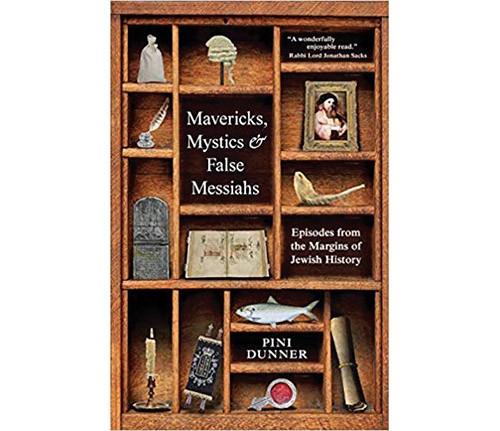
Reviewing: “Mavericks, Mystics & False Messiahs: Episodes From the Margins of Jewish History,” by Rabbi Pini Dunner. Toby Press; 2018. Hardover. 231 pages. English. ISBN-13: 978-1592645107.
In a fascinating new book, “Mavericks, Mystics & False Messiahs: Episodes From the Margins of Jewish History,” Rabbi Pini Dunner takes the reader to some of the weirdest stuff that has transpired in the Jewish world over the last 350 years. There are some great sages detailed here, along with some sinners, crazies, charlatans and more.
The subtitle of the book is “Episodes From the Margins of Jewish History,” and Dunner shows that even though many of the events in the book are outliers, they still have a significant effect on the Jewish world even today. Dunner notes that oddities in the Jewish world tend to shed light on what is wrong with the system that produced them. While not a perfect formula, there is indeed a lot to learn from some of the stories in the book.
The book opens with perhaps the most notorious event of the last 400 years, the story of Shabbetai Tzvi. It’s quite easy for us today to superimpose our knowledge and look at the Shabbetai Tzvi debacle with incredulousness. It’s equally hard for us to imagine how the masses, and even one of the greatest sages of the generation, could fall victim to one of the greatest theological frauds of the last 2,000 years.
The success of Shabbetai Tzvi is attributed to myriad reasons, including people not understanding the nature of his severe bipolar disorder. That, combined with their intense longing for moshiach, coalesced with other factors to create a perfect storm for a false messiah.
Shabbetai Tzvi again rears his ugly head in the chapter where Dunner recounts the controversy where Rabbi Yakov Emden accused Rabbi Yonason Eybeschutz of being a Sabbatean. R’ Emden felt that the amulets R’ Eybeschutz wrote to help pregnant women contained codes that showed that Shabbetai Tzvi was the messiah and R’ Eybeschutz was a closet Sabbatean.
The Emden/Eybeschutz conflict was certainly one of the most painful, if not most bizarre, rabbinic disputes over the last few hundred years. Ironically, as nefarious as the charges were against R’ Eybeschutz, it is astonishing this epic battle had no residual effect on either on either of these great sages. While the Emden/Eybeschutz episode was well researched, Dunner surprisingly does not reference Rabbi Dr. Sid Leiman, who is one of the most renowned experts on the topic.
In another story, Dunner details the Get of Cleves from 1766. Part of the issue was that the dayanim of the city of Frankfurt refused to publish their legal arguments, or publish refutations of the reasons published by those who opposed them, in reference to a divorce case in the city of Cleves. Since their stance was so contentious, it seemed odd that they refused to back up their views with solid evidence and source-based material.
The Get of Cleves case was in some ways quite similar to the Langer case 200 years later, where chief Rabbi Shlomo Goren refused to publish the details of his ruling, in addition to not sharing the names of the rabbis who signed on to his ruling.
All of the stories in the book are engaging and fascinating. Other topics include the story of the Maharal Hagadah, which was an elaborate forgery; the story of Ignatius Timothy Trebitsch-Lincoln; and more.
The tale of Trebitsch-Lincoln is so bizarre, one almost strains to realize it’s not fiction. Dunner writes that he was born in Hungary to an Orthodox family and was known as Avraham Schwarz in 1879. By the time he dies in 1943, he was a con man, Protestant missionary, Anglican priest, member of the British Parliament for Darlington, German politician and spy, Nazi collaborator and, at his death, a Buddhist monk in China.
This is a most enjoyable book, and its only disappointment is its short page count. Anyone who has watched his videos knows that Rabbi Dunner is a most captivating speaker. In “Mavericks, Mystics & False Messiahs: Episodes from the Margins of Jewish History,” he shows that he is an equally good writer.
By Ben Rothke
Ben Rothke lives in New Jersey and works in the information security field. He reviews books on religion, technology and science.











